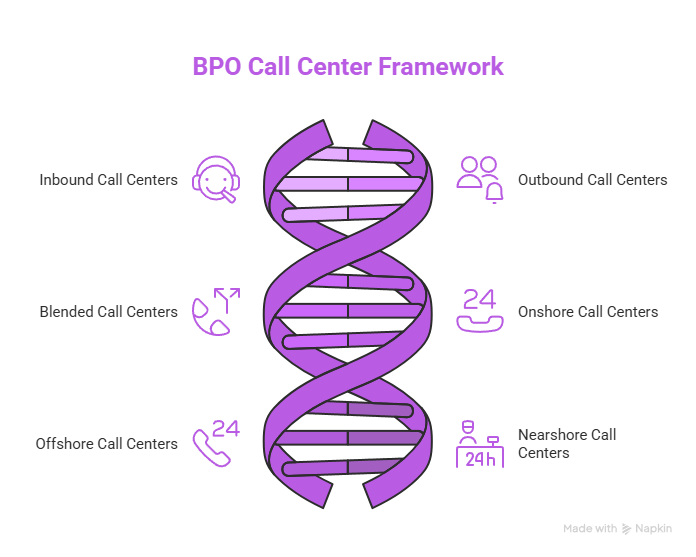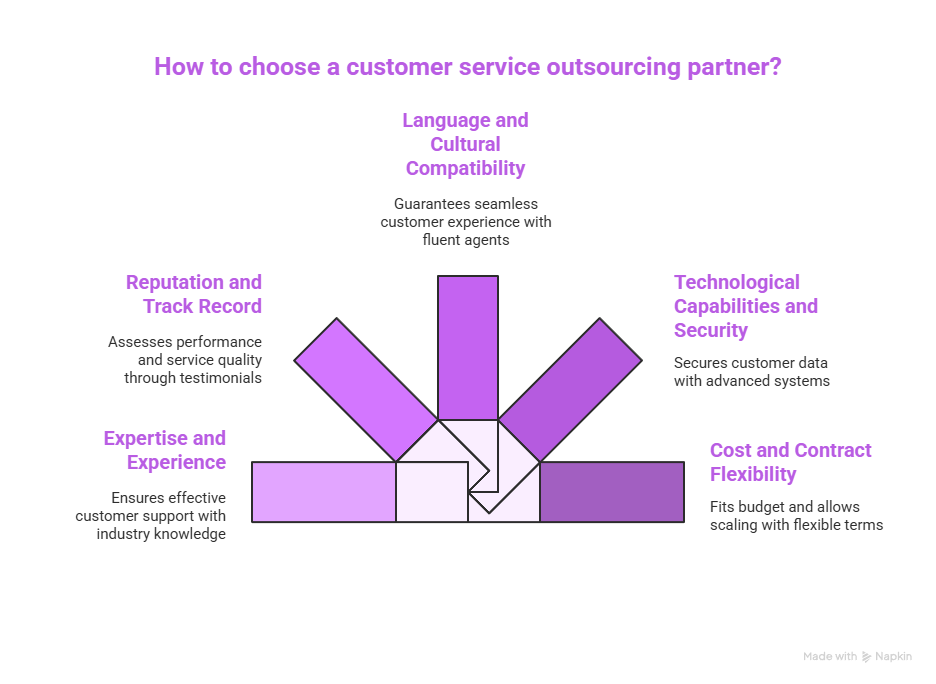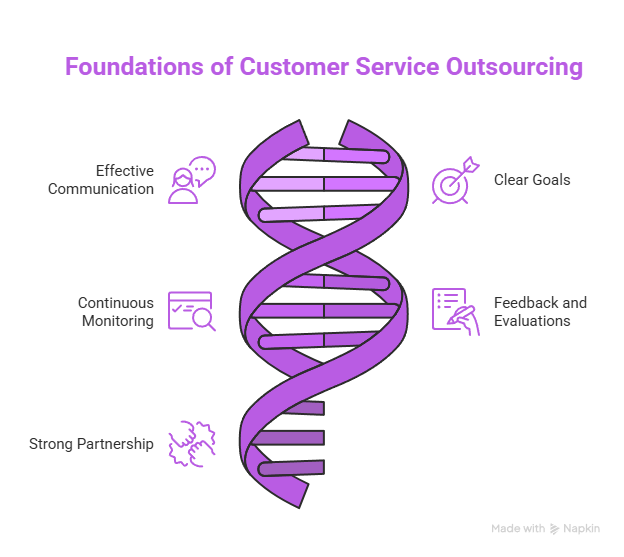What is Customer Service BPO?
07 Jun 2023 By: Michael Kansky
Updated
Businesses today need to work smarter and serve customers better. That’s why companies are turning to Customer Service BPO (Business Process Outsourcing). Outsourcing customer service streamlines operations and improves support. It helps companies focus on their main goals while experts handle customer interactions.
Learn how Customer Service BPO can boost efficiency and strengthen customer loyalty.

BPO stands for Business Process Outsourcing. Sounds fancy, but it’s simple. You hand over specific tasks to people who specialize in them.
In my case, it was customer service.
Bad customer service can kill a business faster than you think. But great service? It keeps customers coming back. When people feel heard and helped, they remember it.
The best part? Our team doesn’t burn out answering the same questions every day. They get to focus on improving products, creating better content, and serving more people.
I once read from Bain & Co. that even a 5% boost in customer retention can raise profits by almost 95%. That stuck with me. It reminded me that customer service isn’t just a department — it’s the heartbeat of the business.
Key Takeaways
Here’s what Customer Service BPO really does for you:
- It makes your business more efficient.
- It keeps your customers happier.
- And it frees you up to focus on bigger goals.
But not all outsourcing companies are the same. Some get it. Some don’t.
Before you hire one, look at how they communicate. Ask how they train their people. Check what kind of tech they use. Make sure they understand your customers.
Outsourcing works best when both sides talk often, track results, and stay honest about what’s working and what’s not.
There are three types of BPO:
- Offshore: A team in another country, often more affordable.
- Nearshore: A team in a nearby country, easier for communication.
- Onshore: A local team within your country.
Pick what fits your goals and budget.

Understanding Customer Service Outsourcing
Outsourcing customer service has benefits and risks. With the right elements, it can save money, boost revenue, lighten workloads, and give access to top technology. To ensure success, check out these customer service outsourcing channels:
- Call center outsourcing lets businesses focus on their core products and services. It provides more productive time for front office business operations like product development, marketing, and sales.
- Help desk outsourcing is a valuable service wherein a provider manages the resolution of user issues. This includes technical issues concerning IT infrastructure and applications. This outsourcing solution offers several advantages to organizations, including the avoidance of staffing challenges, enhanced user satisfaction, and decreased support expenses.
- Social media outsourcing holds significance as well. Social Media Management focuses on providing quick responses. This is highly important due to the number of people spending their spare time on various social media platforms.
- Live chat and email support boost the confidence of clients to do business with you knowing they can get immediate help. They also help reach your target customers.
- Enhance communication with your customers using WhatsApp, Chatbot. Automate responses, manage inquiries with platforms like Kommo, and provide 24/7 assistance. Customize messages and collect data for exceptional customer service.
As reported by Forbes, great customer service begins with having core values and a clear mission to share with your customer service teams.
Benefits of Customer Service Outsourcing
Outsourcing customer service provides benefits like cost savings and better efficiency. Outsourcing companies often have advanced technology and systems. This gives businesses access to superior tools without big investments.
Another advantage is scalability and flexibility. It helps companies adapt to changing customer demands. You can scale up when you’re busy and scale down when things slow.
Outsourcing customer service improves the customer journey. It allows businesses to provide 24/7 support. Outsourcing companies often support multiple channels like phone, email, chat, and social media. This lets customers pick their preferred method.
That kind of accessibility builds trust. And trust keeps people coming back.
Trending Now
An article from AZ Big Media recommends outsourcing customer service to alleviate stress and enhance efficiency. Advising business owners to evaluate their existing customer service approach, pinpointing areas for improvement and outsourcing. Steps include:
- Selecting a reliable call-handling service
- Setting a budget for cost control
- Transparently discussing changes with existing staff.
These measures help ensure a seamless transition to external customer service. Enabling owners to concentrate on core business tasks while preserving good customer relationships.
Types of BPO
BPO and customer service outsourcing both delegate processes to third-party agencies. It can cover a wider range of functions beyond customer service, such as finance and HR. Customer service outsourcing focuses solely on customer support and related activities.
There are three main types of BPO:
- Nearshore outsourcing involves delegating processes to a nearby country. This offers geographic proximity and cultural alignment.
- Offshore outsourcing involves outsourcing to a distant country for cost savings and access to specialized skills.
- Onshore outsourcing refers to domestic outsourcing, providing local expertise and control.
Organizations should assess their specific needs and priorities to choose the best outsourcing approach. Some of the decision factors are cost, expertise, and company requirements.
BPO Call Centers

A BPO call center is a facility or outsourced service that manages a company’s phone-based customer interactions. It’s the main contact point for customers for support and resolving queries.
These call centers use advanced software, CRMs, and sometimes AI to manage large call volumes smoothly. This technology aids data-driven decisions, offering businesses key analytics for strategic planning.
Types and structures of BPO call centers
- Inbound Call Centers: These centers handle incoming calls, answering questions, processing orders, and resolving issues. Agents need strong customer service skills.
- Outbound Call Centers: These centers make outgoing calls—“outgoing call mean” the agent initiates the conversation rather than receiving it—for telemarketing, sales, surveys, and debt collection. Agents need persuasive communication skills.
- Blended Call Centers: Blended centers manage both incoming and outgoing calls, offering flexibility and efficient resource use for varied call volumes.
Call Center Structures
Call center structures can vary based on location and organizational preferences:
- Onshore Call Centers: Onshore call centers are based in the same country as the company they serve. This setup reduces language and cultural barriers, aligns time zones, and can be cheaper than in-house operations.
- Offshore Call Centers: Offshore call centers are in a different country from the company they serve. They save costs through cheaper labor and access to global talent. Time zone differences allow for 24/7 customer service.
- Nearshore Call Centers: Nearshore call centers are in neighboring countries. They offer benefits like proximity, cultural similarity, and often lower costs than offshore centers. This setup allows for close collaboration and similar time zones, making outsourcing cost-effective.
No matter the setup, a good call center feels like an extension of your own team.
Disadvantages of BPO
Outsourcing Business Process Outsourcing (BPO) has a lot of benefits. But outsourcing has its downsides too. These downsides should be managed well to avoid operation issues.
Public Backlash
Outsourcing jobs to other countries can sometimes look bad to the public.
People might think it takes away local jobs.
Some may also believe that overseas work means lower quality.
To avoid this, be transparent about why you’re outsourcing and how it helps your customers.
Communication Breakdowns
If communication isn’t clear, teams can stop sharing information.
That causes confusion and slows down work.
To fix this, create a plan for regular updates and open communication.
Make sure your in-house and outsourced teams work together, not separately.
A Learning Curve
Every new outsourcing setup takes time to get right.
The BPO team needs to learn your processes, products, and customers.
This can cause small mistakes at first.
Start slowly, train them well, and ask how they handle onboarding new clients.
Loss of Control
When you do everything in-house, it’s easy to keep an eye on quality.
Outsourcing means you’ll have to trust someone else to do that.
Pick a BPO company with a good track record.
Ask for references or talk to their current clients before you sign anything.
Security Breaches and IP Protection
Sharing data with an outside company always comes with risks.
There’s a chance of leaks or data theft if security is weak.
Protect yourself by checking their safety standards before you start.
Make sure they follow strict security rules and review them regularly.
Shared Reputational Risks
If your BPO partner acts unethically, it can hurt your brand too.
Do your research before choosing one.
Add clear rules in your contract about fair practices and data handling.
That helps protect your reputation.
Hidden Costs in Contractual Agreements
Outsourcing contracts can have extra fees hidden in the fine print.
These small costs can add up fast.
Always read your contract carefully before signing.
If you can, have a lawyer check it for you to avoid surprises later.
Factors to Consider When Choosing a Customer Service Outsourcing Partner

When choosing a customer service outsourcing partner, consider various factors such as:
- Expertise and Experience: Ensure the BPO has industry knowledge to understand your customers and provide effective support.
- Reputation and Track Record: Review testimonials and case studies to assess their performance and service quality.
- Language and Cultural Compatibility: Confirm agents are fluent and culturally aware to ensure a seamless customer experience.
- Technological Capabilities and Security Measures: Check their systems and data protection protocols for secure handling of customer info.
- Cost Considerations and Contract Flexibility: Ensure pricing fits your budget and the contract allows for scaling and adapting to changes.
Considering these factors when choosing a customer service outsourcing partner will help you make an informed decision. Pick a partner that can effectively meet your business requirements and deliver exceptional customer service, states Forbes.
Best Practices for Successful Customer Service Outsourcing to a BPO

To establish successful customer service outsourcing, follow these best practices:
- Employ Effective Communication and Collaboration: Maintain clear, regular contact with the outsourcing provider to address issues quickly.
- Set Clear Goals and Expectations: Define outcomes, performance metrics, and service-level agreements to align expectations.
- Perform Continuous Monitoring and Quality Assurance: Regularly review calls, surveys, and performance to ensure high-quality service.
- Conduct Regular Feedback and Performance Evaluations: Provide constructive feedback and conduct regular evaluations for continuous improvement.
- Build a Strong Partnership: Foster trust and open communication for better collaboration and service strategies.
By following best practices, you’ll increase your outsourcing success and achieve your desired outcomes.
BPO Statistics, case studies, growth and trends
There are various data and statistics available that showcase the growth of the BPO industry, particularly in customer service:
- Market Growth: The BPO sector is growing rapidly, with the global market valued at $221.5 billion in 2019 and projected to grow at 8% CAGR by 2027 (Grand View Research).
- Customer Service Outsourcing: Customer service outsourcing is also expanding, valued at $84.1 billion in 2020 and expected to reach $130 billion by 2025, growing at 9.1% CAGR (Mordor Intelligence).
- Efficiency Gains: Outsourcing saves costs, with 59% of businesses reporting savings as a primary benefit (Deloitte). A 5% increase in customer retention can boost profits by 25-95% (Bain & Co).
- Customer Retention: Bain & Co reports that a 5% increase in customer retention can boost profits by 25 to 95%. Outsourcing customer service to enhance satisfaction can be a valuable strategy for a significant return on investment.
- Nearshore and Offshore Outsourcing: Nearshore and offshore outsourcing are popular, with the nearshore market set to hit $35.35 billion by 2023 and offshore services reaching $92.5 billion in 2019 (Market Research Future, Statista).
- COVID-19 Impact: COVID-19 accelerated BPO demand, as 70% of organizations sped up digital transformation (NTT Ltd). The need for multichannel support is rising, with companies that excel in omnichannel engagement retaining 89% of customers (Aberdeen Group).
- Multichannel Support: BPO provides flexibility, scalability, 24/7 service, and improves customer satisfaction while cutting costs by 26% (Hackett Group, Microsoft, Deloitte).
- Flexibility and Scalability: BPO offers businesses significant flexibility, allowing them to quickly scale operations based on demand. A Deloitte survey notes that 47% of companies use outsourcing to manage capacity issues, highlighting its role in adapting to changing business needs.
- 24/7 Customer Service: The demand for continuous customer service is growing, and BPO enables 24/7 availability. Microsoft’s survey reveals that 36% of global consumers expect customer service teams to be accessible at all times.
- Customer Satisfaction: Outsourcing customer service can boost satisfaction levels. The Hackett Group reports that businesses using outsourced services not only enhance customer service but also cut costs by 26%.
I’ve seen firsthand how it helps. A few clients told me that once they started outsourcing support, their customer satisfaction scores shot up.
59% of companies say outsourcing saves them money. But to me, the real value is time.
Time to plan. Time to build. Time to breathe.
FAQs: Customer Service BPO Outsourcing
What do customer service BPO companies do?
Customer service BPO companies manage a business’s customer interactions through channels like phone, chat, email, and social media. They help streamline operations, reduce costs, and boost customer satisfaction while allowing the business to focus on core functions like marketing and product development.
Why is the importance of customer service in BPO so high?
Customer service is the backbone of BPO success. Strong customer support builds trust, boosts satisfaction, and drives loyalty. According to Bain & Co, even a 10% boost in customer retention can increase company value by 30%, showing that excellent customer service directly impacts business growth.
What is good customer service in BPO?
Good customer service in BPO means providing timely, empathetic, and effective support across multiple channels. It involves using technology like AI and CRM systems for fast resolutions, maintaining a customer-first mindset, and aligning the service team’s values with the client’s brand.
How does ecommerce customer service BPO help online businesses?
Ecommerce customer service BPO teams handle order inquiries, returns, and technical issues 24/7. They improve customer satisfaction by offering multichannel support through live chat, social media, and email—ensuring online shoppers get immediate, reliable assistance that encourages repeat purchases.
What role does entertainment customer service BPO play in the media industry?
Entertainment customer service BPO focuses on supporting audiences through subscriptions, streaming access, event ticketing, and content-related queries. Outsourcing ensures fans and viewers receive quick, accurate help while allowing entertainment brands to focus on content creation and innovation.
How does customer service BPO for the travel industry enhance client satisfaction?
Customer service BPO for the travel industry provides 24/7 multilingual support for bookings, cancellations, and itinerary changes. Agents help travelers solve issues quickly, improving convenience and brand loyalty in an industry that demands real-time responsiveness.
What is the role of a customer service representative in BPO?
A customer service representative (CSR) in BPO acts as the direct link between a company and its customers. They manage calls, emails, chats, and social messages—resolving issues, answering questions, and maintaining brand reputation through exceptional communication and empathy.
How does healthcare customer service BPO improve patient experience?
Healthcare customer service BPO providers handle appointment scheduling, billing inquiries, and patient support with high confidentiality. They enhance care coordination, reduce administrative workload for medical staff, and ensure patients receive prompt, professional assistance.
What factors should businesses consider when choosing a customer service BPO partner?
Businesses should look at a BPO’s expertise, reputation, language compatibility, technology, data security, and cost flexibility. Selecting a partner that aligns with your brand values and has experience in your industry ensures a smoother outsourcing experience and higher customer satisfaction.
What are the risks of outsourcing customer service, and how can they be managed?
Common risks include communication breakdowns, loss of control, security issues, and hidden costs. These can be managed by setting clear goals, maintaining open communication, conducting regular audits, and choosing a transparent, reputable BPO partner.
Conclusion
Business process outsourcing (BPO) is a great strategy for growing businesses. I used to think I had to do everything myself. Now I know better.
As businesses grow, the need for customer service BPO keeps rising.
Ecommerce, entertainment, travel, and healthcare companies now rely on outsourced teams for 24/7 support.
Knowing what great service looks like helps brands stay ahead of competitors. With more people using mobile apps, in-app customer support has become a big deal. It gives customers instant help and makes their experience smoother and more personal.
HelpSquad BPO makes your way to improving your customer service with our professional, bilingual agents, one step away. Bye-bye long waiting lines, hello efficiency. Do not fail to take this chance to raise your level of customer service. Contact us and become one of thousands of successful companies enjoying HelpSquad’s expert virtual assistants and 24/7 customer service team.
Scale Your Customer Service with Expert Outsourcing
Free your team to focus on growth while we handle your customer interactions with care and efficiency. Book a quick intro or review our flexible pricing options today.


